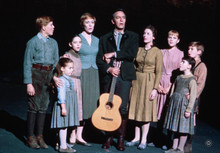 Loading... Please wait...
Loading... Please wait...New Products
Our Newsletter
Product Description

Product Reviews
-
"My heart will be blessed with "THE SOUND OF MUSIC" (1965):

Posted by DEWEY MEE on Apr 20th 2024
Versatile director Robert Wise ( "The Set-Up", "The Day The Earth Stood Still", "Somebody Up There Likes Me", "I Want To Live!", and "The Sand Pebbles") had a surprisingly winning way with stage to screen musical adaptations in the 1960's. "West Side Story" (1961), co-directed by Wise and choreographer Jerome Robbins, was an enormous critical and popular success; winning eleven Academy Awards.
"The Sound Of Music" (1965), loosely inspired by the saga of the Austrian Trapp Family and the memoirs of the rather formidable Maria Von Trapp, achieved an astonishing, almost incomprehensible, success. To this day-- nearly 60 years later-- the movie is not so much "watched" as it is "felt" and, above all, "experienced." Critics are quick to dismiss and deride the film for its "saccharine sentimentality", but a closer, more thoughtful analysis reveals the film is far more resonant, relevant, bittersweet and painfully poignant than saccharine. Wise masterfully transformed Rodgers and Hammerstein's final stage musical into a worldwide cinematic phenomenon.
Ernest Lehman's screenplay is a vast improvement on the stage libretto by Howard Lindsey and Russell Crouse. Wise's decision to shoot the film on location for several months in Austria was particularly genius and inspired. Cinematographer Ted McCord's beautiful location photography gives more strength and drama to the songs and story. From the opening sequence, as the camera seems to fly over the majestic Austrian Alps; zooming down to reveal Julie Andrews as Maria singing joyously in a mountainside meadow, we are enchanted and a bit breathless.
Maria aspires to be a devout nun, but her impetuous nature drives the nuns at Nonnberg Abbey to distraction. "I can't seem to stop singing wherever I am... and, what's worse, I can't seem to stop saying things," she confesses to the Reverend Mother (Peggy Wood). Although sympathetic, the Reverend Mother sends her out for several months to serve as governess to the seven children of widower Captain Von Trapp (Christopher Plummer).
Plummer (who for years referred to the film as "The Sound Of Mucus" until he mellowed out in older age) maintains a snarky and sarcastic demeanor throughout. In any event, the Captain is quickly off to Vienna to visit his cosmopolitan fiancé Elsa Schrader (Eleanor Parker) and his seemingly gay friend, musical impressario Max Detweiler (Richard Hayden).
Maria loves music and nature, and Julie Andrews portrays her as an effervescent force of nature. She is a blessing to the Captain's seven neglected children-- and her teaching them to sing is a not so subtle act of subversion. "Father doesn't like us to sing", the children protest. "Well, perhaps we can change his mind," Maria replies with defiant determination. They proceed to cavort all over Salzburg, singing up, down and around the "Do Re Mi" musical scale in a brilliantly edited montage sequence.
Elsa is a bit witchy, but she is no fool. When she notices romantic sparks between Maria and the Captain, she exits in a dignified manner. Maria and the Captain are married. The family finally comes together again just as Austria falls apart in the dreadful Nazi Anschluss of 1938. Shortly after ripping a Nazi flag from the wall of his villa, the Captain receives a commission to the naval forces of the Third Reich. "Refusing them would be fatal for all of us," the Captain says, "and joining them would be unthinkable."
The film received ten Academy Award nominations, winning in five categories; including "Best Picture" (1965), "Best Film Editing", "Best Director": Robert Wise, and "Best Musical Scoring": Irwin Kostal. Zeus offers a beautiful Widescreen print of the film. (2 hours, 54 minutes).
Currency Converter
Choose a currency below to display product prices in the selected currency.
















